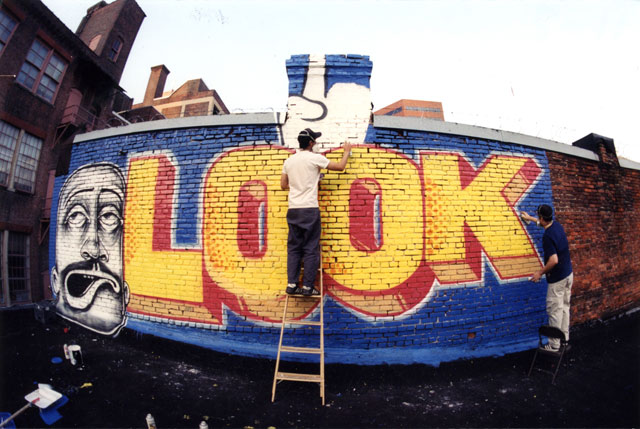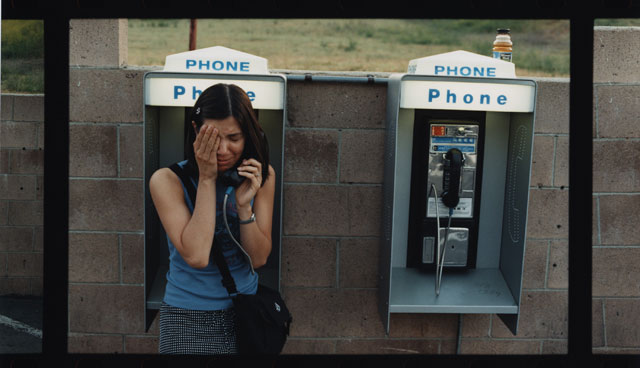
We’ve long been fans of Aaron Rose and everything that falls within his astute, artistic gaze. So we were pretty excited to see Beautiful Losers, a documentary about him and his fellow renegade DIY artists from NYC back in the days. The roll-call of artists includes Thomas Campbell, Shepard Fairey, Barry McGee, Geoff McFetridge, Ed Templeton, Jo Jackson, Harmony Korine and Margaret Kilgallen. But the film is as much about them as it is a poignant everyman tale of youth and friendship. We caught up with director Aaron Rose.
You guys were self-consciously outside the art establishment then, do you feel you’re a part of it now?
For sure yes, unfortunately.
Would it be possible for you guys to be outsiders now?
I think it’s always possible to go back. It’s a question that each individual artist has to ask him- or herself. Different artists have different motivations or different ideas for projects that they want to do that require funding or access to certain kind of spaces and there are compromises that you have to make to get that kind of opportunity. I know many artists who got to a point and they were like you know what I’m happy here and they’re still showing in small galleries and they’re not unhappy people.
At what point does the line get crossed?
I think whenever you’re using other people’s money, whether that are corporations or foundations. If they’re giving you loads of cash to execute projects and they end up owning a stake in that project, but that’s just the way the world works. As soon as somebody else owns a stake in your art, you don’t have the freedom that you would have if you were just operating completely independently.
On the upside more people get to see your art?
Yes and no, it’s funny as the art world is a such an elite structure, so in some ways the more famous you get the less people see your work because the dinner parties get smaller and smaller and smaller.
How do you think history will judge the Beautiful Losers?
You know, who knows. The art world is a fickle business and sometimes it takes 50 years for something to get really big, even though there’s been an element of success. A handful of the artists featured in the film that come out of this world we’re talking about are now firmly establishment blue chip artists, but that doesn’t necessarily mean that in 50 years they’re going to be the important ones. The MOMA is full of pieces from artists that went nowhere and I’ve seen it happen a bunch of times. Sometimes the sleeper that did nothing when they were alive ends up becoming the most well known in art history. I’m always suspicious of the artists who are hyped a lot, as it my experience of studying art history those people never last, where as a slow build is a much more steady way to approach art world success.

Who would you say are the equivalent of you guys now?
Who knows who’s going to pop up above the threshold of the underground or not. But there are always groups of artists working together. There’s a collective that came out of the Providence Rhode Island comic book scene and I’m sure there are lots of clusters of people in London that are doing stuff. There’s a magazine in London called Paperback. That whole crew is very familial and they do exhibitions and work with bands so it’s always going on.
Do you think people will still be using Polaroid and Super 8 in 20 years time?
It’s just going to be incredibly expensive to access those kinds of material and that’s what’s going to limit innovation at least with younger artists, when they can do anything they want now very inexpensively. I think we’ll see that become a very niche kind of thing.
Do you think the fact you can make images look like Polaroids on your computer devalues the whole thing?
I’ve never believed the medium is the most important thing in a work of art. It’s what a work of art says or makes you feel or whether or not it’s a beautiful image that matters. If it was printed out on a colour laser printer rather than film it wouldn’t really matter to me as long as the image was strong. We all started painting with house paints that we stole from the hardware store. We weren’t using oil paints we were using the worst kind of paints you could use but that didn’t stop anyone from buying our work.
Do you think being artistic is born of nature or nurture?
I believe everybody is an artist. Wall Street banking and being good at business is really no different from composing a painting to me or being a doctor and assessing illness and figuring out the most creative way of healing this person. It’s just about how this creativity is focused. I don’t think people are born artists and others not, it’s just certain people apply their creative talents in different places. If you start drawing when you’re really young you’re going to be good no matter what, if you do it all the time.
Beautiful Losers is out on DVD now, visit losermovie.co.uk To win a copy click HERE
An edited version of this interview will appear in the next issue of Cooler magazine, on sale September 24. To buy click HERE

